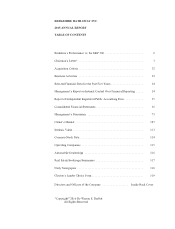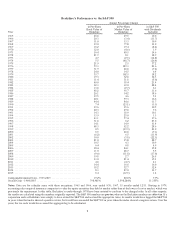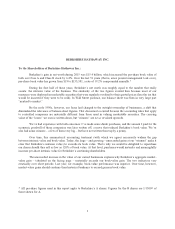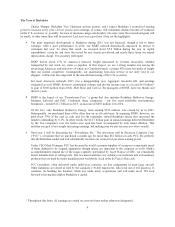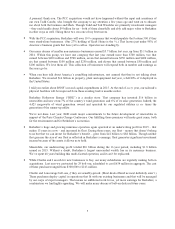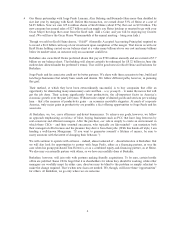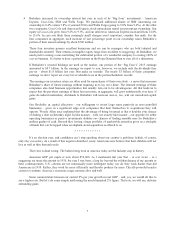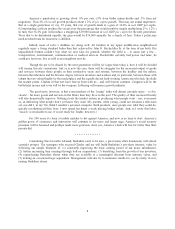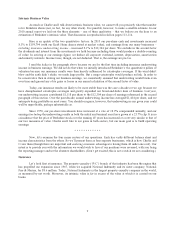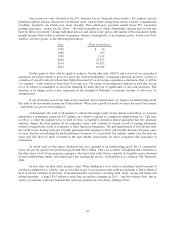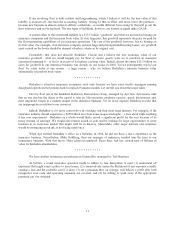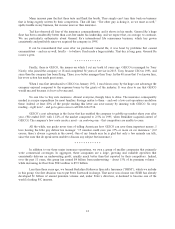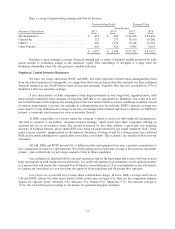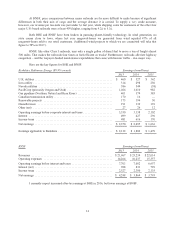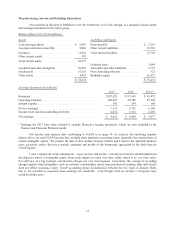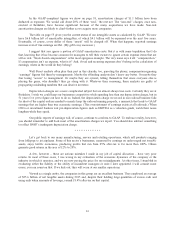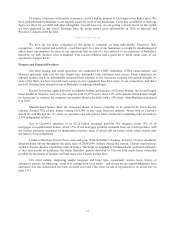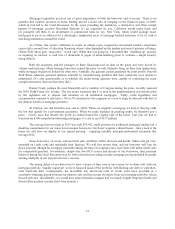Berkshire Hathaway 2015 Annual Report Download - page 10
Download and view the complete annual report
Please find page 10 of the 2015 Berkshire Hathaway annual report below. You can navigate through the pages in the report by either clicking on the pages listed below, or by using the keyword search tool below to find specific information within the annual report.America’s population is growing about .8% per year (.5% from births minus deaths and .3% from net
migration). Thus 2% of overall growth produces about 1.2% of per capita growth. That may not sound impressive.
But in a single generation of, say, 25 years, that rate of growth leads to a gain of 34.4% in real GDP per capita.
(Compounding’s effects produce the excess over the percentage that would result by simply multiplying 25 x 1.2%.)
In turn, that 34.4% gain will produce a staggering $19,000 increase in real GDP per capita for the next generation.
Were that to be distributed equally, the gain would be $76,000 annually for a family of four. Today’s politicians
need not shed tears for tomorrow’s children.
Indeed, most of today’s children are doing well. All families in my upper middle-class neighborhood
regularly enjoy a living standard better than that achieved by John D. Rockefeller Sr. at the time of my birth. His
unparalleled fortune couldn’t buy what we now take for granted, whether the field is – to name just a few –
transportation, entertainment, communication or medical services. Rockefeller certainly had power and fame; he
could not, however, live as well as my neighbors now do.
Though the pie to be shared by the next generation will be far larger than today’s, how it will be divided
will remain fiercely contentious. Just as is now the case, there will be struggles for the increased output of goods
and services between those people in their productive years and retirees, between the healthy and the infirm,
between the inheritors and the Horatio Algers, between investors and workers and, in particular, between those with
talents that are valued highly by the marketplace and the equally decent hard-working Americans who lack the skills
the market prizes. Clashes of that sort have forever been with us – and will forever continue. Congress will be the
battlefield; money and votes will be the weapons. Lobbying will remain a growth industry.
The good news, however, is that even members of the “losing” sides will almost certainly enjoy – as they
should – far more goods and services in the future than they have in the past. The quality of their increased bounty
will also dramatically improve. Nothing rivals the market system in producing what people want – nor, even more
so, in delivering what people don’t yet know they want. My parents, when young, could not envision a television
set, nor did I, in my 50s, think I needed a personal computer. Both products, once people saw what they could do,
quickly revolutionized their lives. I now spend ten hours a week playing bridge online. And, as I write this letter,
“search” is invaluable to me. (I’m not ready for Tinder, however.)
For 240 years it’s been a terrible mistake to bet against America, and now is no time to start. America’s
golden goose of commerce and innovation will continue to lay more and larger eggs. America’s social security
promises will be honored and perhaps made more generous. And, yes, America’s kids will live far better than their
parents did.
************
Considering this favorable tailwind, Berkshire (and, to be sure, a great many other businesses) will almost
certainly prosper. The managers who succeed Charlie and me will build Berkshire’s per-share intrinsic value by
following our simple blueprint of: (1) constantly improving the basic earning power of our many subsidiaries;
(2) further increasing their earnings through bolt-on acquisitions; (3) benefiting from the growth of our investees;
(4) repurchasing Berkshire shares when they are available at a meaningful discount from intrinsic value; and
(5) making an occasional large acquisition. Management will also try to maximize results for you by rarely, if ever,
issuing Berkshire shares.
8



